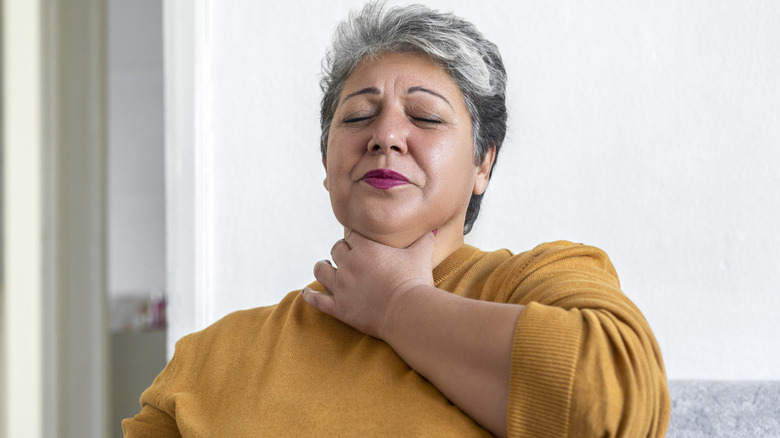What It Means When You Have A Coughing Fit After Laughing
Does this sound familiar? You've just sent a text ending in "lol," but are you really laughing out loud? Many of us let out a mild chuckle here or there throughout the day, but the gift of a deep, clutching-at-your-lungs type of laugh only comes around every once in a blue moon. If you find yourself in the throes of laughter, only to be suddenly struck with an uncontrollable coughing fit, it means you may have aggravated your airways in the process, according to experts at Respiratory Therapy Zone.
A few things happen simultaneously as we laugh. Our diaphragm and abdominal muscles tighten, and air is vigorously propelled from our airways. This can cause irritation, which prompts the surrounding nerves in our airways to tell our brain that there is a perceived irritant present. As a result, the body responds by coughing. A laughing-related cough isn't unusual or dangerous to experience every so often. However, if these coughing fits are a regular occurrence, it may be indicative of an alternate health issue.
Regular coughing fits after laughing might mean that you have asthma or GERD
If you regularly experience coughing fits after laughing, it may be a sign of asthma. In a 2012 study published in the European Respiratory Journal, researchers examined 43 patients diagnosed with asthma and 31 patients who did not experience asthma but were diagnosed with another respiratory condition. Most participants were older adults. Out of those diagnosed with asthma, all but one patient experienced coughing in relation to laughter. Oppositely, only one patient in the non-asthma group experienced laughter-related coughing. The researchers determined there to be a strong correlation between asthma, specifically, and coughing with laughter. Experts at Respiratory Therapy Zone state this often occurs in asthma patients because their airways narrow while laughing, triggering a coughing response.
Alternatively, a coughing fit after a robust laugh may be indicative of gastroesophageal reflux disease (GERD). Laughing can cause stomach acids to move backwards into the esophagus, prompting symptoms such as heartburn, regurgitation, chest pain, difficulty swallowing, and more. This discomfort can subsequently lead to coughing.
How to reduce the chances of coughing after laughing
Nobody wants a delightful bout of laughter interrupted by a nasty cough. Therefore, be sure to seek treatment for asthma or GERD if these conditions are the cause of your laughter-related cough. Otherwise, implement healthy habits to minimize airway irritation and keep your body strong, such as drinking plenty of fluids, refraining from smoking, and getting routine exercise.
According to the National Health Service (NHS), you can also try utilizing the stop-cough technique if your cough has been activated by laughter. This involves covering your mouth with your hand as soon as you become aware of an impending cough. Proceed to swallow once, hold your breath momentarily, and begin taking slow breaths for about half a minute. Focus your mental energy on not coughing. Inhale normally through your nose and remove your hand from your mouth. Repeat this technique as needed.
Remember, though, that coughing isn't necessarily a bad thing. The American Lung Association points out that laughing can provide us with various mental and physical health benefits, so don't always be so quick to stifle that cough!



